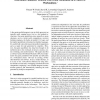Free Online Productivity Tools
i2Speak
i2Symbol
i2OCR
iTex2Img
iWeb2Print
iWeb2Shot
i2Type
iPdf2Split
iPdf2Merge
i2Bopomofo
i2Arabic
i2Style
i2Image
i2PDF
iLatex2Rtf
Sci2ools
131
click to vote
OSDI
1994
ACM
1994
ACM
Distributed Filaments: Efficient Fine-Grain Parallelism on a Cluster of Workstations
A fine-grain parallel program is one in which processes are typically small, ranging from a few to a few hundred instructions. Fine-grain parallelism arises naturally in many situations, such as iterative grid computations, recursive fork/join programs, the bodies of parallel FOR loops, and the implicit parallelism in functional or dataflow languages. It is useful both to describe massively parallel computations and as a target for code generation by compilers. However, fine-grain parallelism has long been thought to be inefficient due to the overheads of process creation, context switching, and synchronization. This paper describes a software kernel, Distributed Filaments (DF), that implements fine-grain parallelism both portably and efficiently on a workstation cluster. DF runs on existing, off-theshelf hardware and software. It has a simple interface, so it is easy to use. DF achieves efficiency by using stateless threads on each node, overlapping communication and computation, emp...
Fine-grain Parallelism | Iterative Grid Computations | Operating System | OSDI 1994 | Parallel For Loops |
Related Content
| Added | 02 Nov 2010 |
| Updated | 02 Nov 2010 |
| Type | Conference |
| Year | 1994 |
| Where | OSDI |
| Authors | Vincent W. Freeh, David K. Lowenthal, Gregory R. Andrews |
Comments (0)

